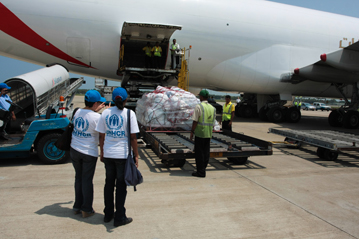Security on Chad-Sudan border worsening, warns UNHCR
Security on Chad-Sudan border worsening, warns UNHCR

ADRE, Chad, Nov 26 (UNHCR) - The security situation along Chad's eastern border with Sudan has deteriorated over the last few weeks, raising fresh concerns about the safety of more than 65,000 Sudanese refugees living in nearly 20 sites close to the volatile frontier.
Over a three-week period, Sudanese Arab militia have launched six raids on various refugee and Chadian communities in what UNHCR staff have described as "bolder and more aggressive attacks".
Hundreds of head of cattle, some of them belonging to refugees, have been stolen by militia said to be on horseback. The raids have been launched mainly during the day, although the village of Hachaba, some 7 km south-east of Adré border town, was attacked at about midnight on November 18. The attackers made off with 44 head of cattle during this raid.
In another incident, a UNHCR vehicle carrying the agency's emergency staff scared off the militia in the village of Barrata, some 200 metres from the unsafe border. Refugees said the armed men mistook the sound of the approaching UNHCR car for a military vehicle. The attackers, however, returned later that day in a renewed raid, killing one Chadian villager and stealing 216 head of cattle.
Meanwhile, ongoing violence across the border in Sudan continues to drive Sudanese refugees into eastern Chad. Chadian local authorities said that in one attack, Sudanese Arab militia torched six Sudanese villages just over the border from Borota on November 12. UNHCR staff in eastern Chad later witnessed thick smoke billowing from the burning homes, and interviewed 10 new refugee families who said they had fled the militia attack in which they had lost their homes.
The cross-border incursions come amid escalating violence in Sudan's Darfur region that has displaced nearly half a million people by some estimates. More than 65,000 others have fled over the border into eastern Chad.
Hobbled by the prevailing insecurity and a lack of travel permits from the Khartoum government, aid agencies have recently been unable to deliver urgently-needed supplies to the strife-torn region, raising fears that more people may decide to go to Chad in search of relative safety and assistance.
For the past few years, the Darfur region in western Sudan has been the scene of a conflict pitting nomadic groups against sedentary agricultural people such as the Fur, Zaghawa and Masalit.
Early this year, the Sudan Liberation Army - the military wing of the Sudan Liberation Movement (SLM) - took up arms to protest against the perceived lack of government protection for the farming communities in Darfur. The government responded militarily. The conflict has heightened ethnic tensions between Sudanese of Arab origin and those of African origin in western Sudan.
In eastern Chad, UNHCR is continuing with the distribution of food and relief supplies despite growing concerns about security and difficult access to many locations where the Sudanese refugees have spontaneously settled. To date, more than 10,000 vulnerable refugees living in various sites along a 1,000-km stretch along the border have received food and basic supplies.
A general registration of refugees has also been started by the Chadian government department handling refugee issues. Registration information will help in the planned transfer of refugees from the dangerous border areas to safer sites inland.
UNHCR has continued searching for sites for the relocation of refugees. Out of nearly one dozen sites assessed so far, only two meet the requirements, which include the availability of water. As the dry season approaches and available water resources decrease, the preparation of potential relocation sites has grown more urgent. In addition to the two potential sites, two possible transit areas in the Iriba and Tine area - north-east of Abéché, the main city in eastern Chad - have been identified for possible use during the planned transfer operation.









